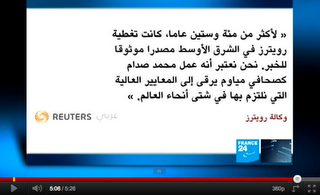This post is part of our special coverage Yemen Protests 2011 [1].
Over the past week Yemeni activists have been enraged [2] after discovering that Reuters reporter Mohammad Sudam, has also been President Ali Abdullah Saleh's personal translator and his secretary since 2009. This clearly raised many issues, besides the integrity of Reuters, the conflict of interest of the reporter and the questionable objectivity of his reporting.It was also alarming because many news agencies around the world depend on Reuters “trusted” and “accurate” reports on Yemen.
This explained to many the media blackout that Yemen suffers from – since the source of information was controlling and selecting what news to publish and what not to.
A Yemeni abroad @NotUntilHeFalls [3] tweeted:
essentially they have been instrumental in providing misinformation about the nature of what is going on in #yemen #shameonreuters legal?
Yemeni blogger @dory_Eryani [4] along with other Yemeni activists went on a mission to expose Reuters and demanded a formal apology. She tweeted:
I -as a Yemeni- demand an apology from @Reuters . doryaleryani.blogspot.com/2011/11/blog-p… Retweet if you agree #ShameOnReuters #Arabspring #Egypt #Tunisie
She explains in Arabic how the #ShameonReuters campaign developed in the program “Aswat Alshabakah” on France24 Arabic channel (video posted by france24arabic [5]):
Others also supported the campaign, such as Arab journalist Dima Khatib, who posted a blog [6] in Arabic, highlighting the power of Twitter in a smart title, “Reuters’ scandal with Saleh and Twitters’ power”.
France24 reporter Tatiana El Khoury @AswatF24 [7] asked Reuters for an explanation and got an official response which she sent to Emirati @SultanAlQassemi [8] who quoted it in his blog:
Reuters responds to social media criticism on hiring Yemen President Saleh's personal translator as its correspondent j.mp/rDm4uZ [9]
The official statement by Reuters reads:
“For more than 160 years, Reuters coverage has been a trusted source in the Middle East. Mohammed Suddam's contributions to the file as a stringer are balanced and meet the high standards we set for the news organization globally.” – Reuters
Brian Whitaker, a journalist at the Guardian tweeted:
@Brian_Whit: [11] The problem with Sudam being employed by both Reuters and Yemen's president is conflict of interest. bit.ly/tH5dN7 [12] #ShameOnReuters
Reuters’ disappointing response just added insult to injury and angered Yemeni activists further, and as many said it just showed the organisation's arrogance.
Bahraini blogger (and Global Voices contributor) Amira Al Hussaini tweeted in dismay:
@JustAmira [13]: Wow Reuters! Come down from your high horse: objectivity? neutrality? #ShameOnReuters #YEMEN
A Yemeni abroad who goes by the name @NotUntilHeFalls [14] lamented Reuters’ 160-year history:
@reuters if those 160 years meant anything to u, u shouldn't have sold it so CHEAPLY then, should u? #shameonreuters
He adds [15]:
playing with the lives of civilians in #yemen deserved a more considered response not an arrogant dismissal #shameonreuters
And wonders [16]:
how many times have regime attacks on civilians been reported as ‘clashes’ or ‘conflicts’ by @reuters ? #shameonreuters
Adding [17]:
on many people's mind's is how many lives lost in #yemen have gone unnoticed by biased reporting #shameonreuters
And finally rebukes [14]:
@Reuters Have a little self respect for your 160 year reputation and admit ur shoddy reporting on #yemen #shameonreuters
On Thursday November 17, an article on the New York Times tweeted by @samwaddah [18], indicated that the news agency finally yielded to the Twitter pressure as it indicated “the reporter, Mohamed Sudam, would no longer be working for them from Yemen, though he would likely still provide reports from elsewhere in the Middle East.”
Reuters Stands by Reporter, Mohamed Sudam, Who Also Works for #Yemen [18]‘s President: http://nyti.ms/w3g55K [19] #ShameOnReuters [20]
But Reuters finally did get the message as @Brian_Whit tweeted [21]:
Mohamed Sudam is “no longer reporting for Reuters from Yemen” http://wapo.st/tclEkZ [22] #ShameOnReuters
This is the official statement on Reuters Facebook page [23]:
Statement from Reuters regarding Mohamed Sudam: Sudam’s work as a Reuters stringer over the course of many years has been fair and accurate. When he became a translator for the president, he disclosed his role to Reuters. On reviewing the matter, however, we believe it’s not appropriate to use a stringer who is also working for the government. He is no longer reporting for us from Yemen.
Through their action on social media. Yemeni tweeps managed to send a powerful message the world that they will no longer tolerate any in accurate or misguided reporting on Yemen.
This post is part of our special coverage Yemen Protests 2011 [1].
